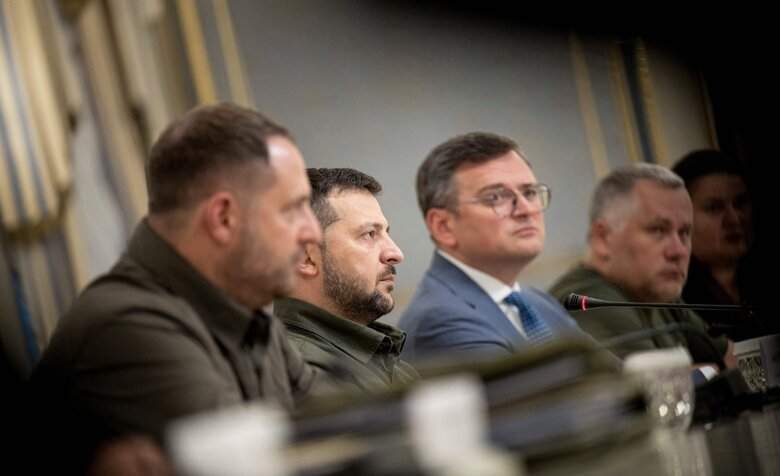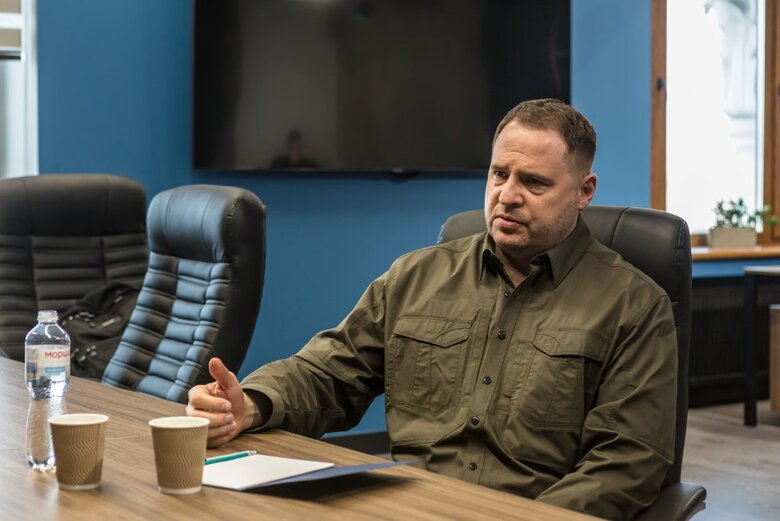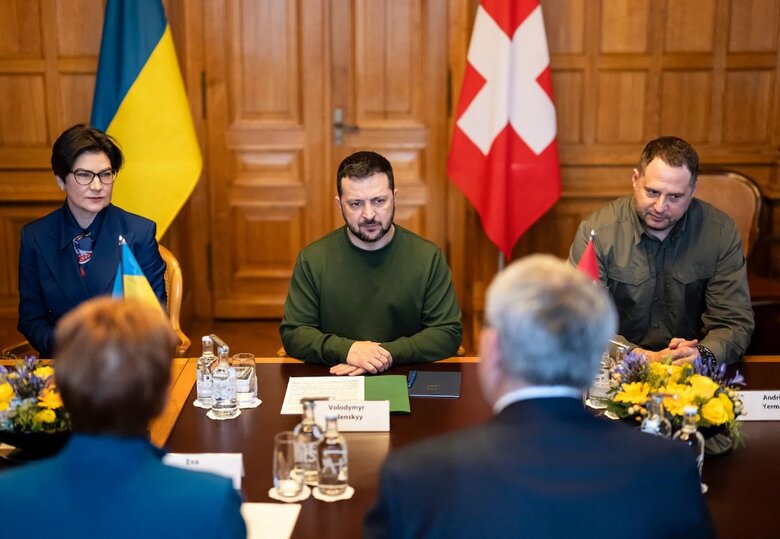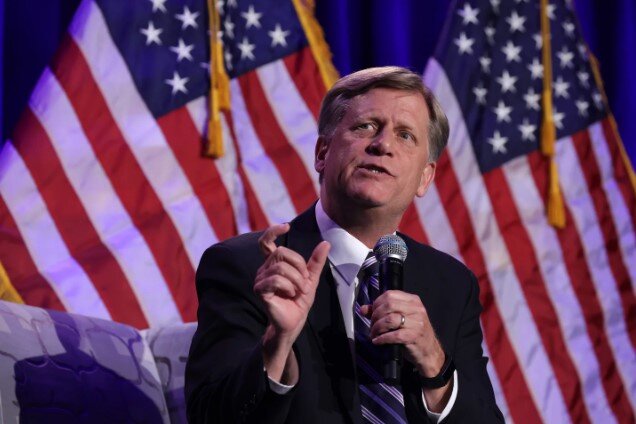Андрей Ермак, бывший юрист и кинопродюсер, который возглавляет президентский офис Владимира Зеленского во время войны, возможно, является самым влиятельным главой администрации в истории Украины.
Об этом пишут в материале для Washington Post Шивон О’Грэйди, Дэвид Л. Стерн, Изабель Хуршудян.
Если главным достижением актера и комика Владимира Зеленского, когда он был избран в 2019 году, было то, что он играл президента на телевидении, то высшей квалификацией всемогущего руководителя его администрации Андрея Ермака было то, что он был другом Зеленского.
Глава Офиса Президента, как формально называется должность Ермака, всегда пользовался огромным влиянием в Украине. Условия военного времени, включая военное положение, сконцентрировали исключительную власть в администрации президента, что сделало Ермака, пожалуй, самым влиятельным главой администрации в истории страны — практически неотличимым от своего начальника.
Ермак и Зеленский так редко появляются друг без друга, что Олег Рыбачук, занимавший пост руководителя администрации тогдашнего президента Виктора Ющенко, выразил некоторый вопрос: кто командует и являются ли они вообще отдельными людьми?
«Ермак, в отличие от многих своих предшественников, попал туда, не имея никакого опыта работы в правительстве», — сказал Рыбачук. «Он с самого начала повторял эту мантру: «Моя единственная мечта, мое единственное стремление — быть тенью президента, быть везде, где президент хочет, чтобы я был».
«Вот так он изображает себя, — добавил Рыбачук, — неотделимым».
Близость Ермака к президенту – и очевидное влияние на него – вызвала шквал обвинений: в том, что он недемократически консолидировал власть в администрации президента; руководил ненужной чисткой высших чиновников, включая главнокомандующего генерала Валерия Залужного; ограничил доступ к Зеленскому; и стремился лично контролировать почти каждое важное решение военного времени.
Однако теперь легитимность президента и его главного советника столкнется с еще более серьезными проблемами, поскольку пятилетний срок Зеленского официально истекает 20 мая. Конституция Украины запрещает выборы в условиях военного положения. Но поскольку Зеленский останется на своем посту, он будет уязвим для обвинений в том, что он использовал войну для подрыва демократии — захвата контроля над СМИ, оттеснения критиков и соперников на второй план и поднятия Ермака, своего друга, которого никто не избирал, над профессиональными государственными служащими и дипломатами.
Некоторые из этих обвинений неоспоримы. В соответствии с указом, изданным Зеленским вскоре после российского вторжения в феврале 2022 года, шесть крупных телевизионных станций 24 часа в сутки транслируют один и тот же новостной контент под названием «Телемарафон Единые Новости», который, по мнению критиков, заставил замолчать инакомыслие.
Любые подобные обвинения наверняка будут выдвинуты Россией, которая в последние дни инициировала новые военные нападения и сейчас оккупирует около одной пятой территории Украины. Подобные обвинения со стороны Москвы были бы лицемерными, учитывая, что президент России Владимир Путин неоднократно обходил ограничения по срокам, чтобы остаться у власти. Но Россия на протяжении десятилетий пыталась посеять внутренние разногласия в Украине, чтобы дестабилизировать страну, и, по мнению экспертов, Кремль не упустит шанс использовать обвинения в том, что Зеленский злоупотребляет властью. И никто не воплощает власть кабинета Зеленского больше, чем Ермак.
«Россияне воспользуются этим», — сказал один украинский чиновник с большим стажем об истекающем сроке полномочий Зеленского. Чтобы сохранить легитимность, Зеленский «должен иметь доверие», сказал этот чиновник, выступая, как и многие другие для этой статьи, на условиях анонимности, чтобы сохранить политические отношения и избежать возмездия.
«Доверие к нему падает, — сказал чиновник, — потому что действия Ермака постоянно отражаются на президенте».
В интервью с более чем дюжиной нынешних и бывших украинских чиновников и законодателей, иностранных дипломатов и других людей, которые знают Ермака или работают с ним, даже его сторонники признали, что он обладает необычайно широкими полномочиями в сфере управления и внешних коммуникаций. Некоторые говорят, что он даже контролирует, каким чиновникам разрешено выезжать за границу и когда — подробность, которую его офис отказался комментировать.
Критики говорят, что в последнее время, когда круг советников Зеленского сузился, Ермак отодвинул на задний план Министерство иностранных дел, вмешивался в военные решения и выступал посредником в ключевых сделках с партнерами, включая Соединенные Штаты — задача, которую, по их мнению, должен решать президент.
Некоторые украинские и западные чиновники говорят, что подозрения в отношении ближайшего помощника президента подрывают авторитет Зеленского и вызывают сомнения в том, кто несет ответственность за решения: Зеленский или назначенный им заместитель, который часто пишет в Твиттере смайликами.
Некоторые чиновники вообще отказались говорить о Ермаке, опасаясь последствий.
Майкл Макфол, бывший посол США в России, который вместе с Ермаком является сопредседателем Международной рабочей группы по российским санкциям, сказал, что Ермак выполняет множество ролей.
«В некотором смысле он де-факто премьер-министр, министр иностранных дел и руководитель аппарата», — сказал Макфол. «Я знаю, как все жалуются на Ермака. … Но я бы сказал, что обратная сторона — это война. И я думаю, что он чертовски эффективен в своей работе».

Нет политического опыта
Бывший юрист и кинопродюсер Ермак, как и Зеленский, не имел подготовки для управления страной, не говоря уже о стране, которую пытаются уничтожить. И все же он это делает. Ермак, когда-то считавшийся тенью Зеленского, теперь рассматривается как часть правящей дуополии.
Даже Ермак признает, что многие просто не хотят его присутствия.
«Зачем здесь снова этот Ермак? Зачем? сказал он в недавнем интервью, подражая своим критикам. Его немного раздраженный ответ: «Я работаю, — настаивает он, — от имени… президента».
Критики Ермака описывают его как раздражительного и властного. Некоторые обвиняют его в том, что он российский агент (сейчас это обычное оскорбление в Украине), что он и его близкие категорически отрицают.
Ермак, которому 52 года, на шесть лет старше Зеленского, родился и вырос в Киеве в семье украинца и матери, родившейся в России, из Санкт-Петербурга. Этот факт он частично защищает, показывая ее фотографию с сине-желтым тату украинского тризуба на предплечье. Она сделала ее на свое 77-летие. Его отец занимал высокопоставленную должность в советском посольстве в Кабуле, что породило слухи о том, что его семья поддерживает связи с Россией и ее службами безопасности.
У Ермака есть брат, 45-летний Денис, обвиняемый в том, что был заснят на видео при попытке использовать свои семейные связи для продажи должностей в администрации Зеленского. Позднее Антикоррупционное бюро Украины тихо закрыло дело, а Ермак заявил, что вся эта неприятная история была «информационной операцией» против его брата, который сейчас служит в украинской армии.
«Никто не любит об этом упоминать», — сказал он о роли своего брата на передовой.
В ведомстве Ермака не назвали конкретную бригаду его брата, но заявили, что он служит в отряде с иностранными добровольцами, «который принимает активное участие в боевых действиях».
Ермак получил степень магистра права в Украинском национальном университете имени Тараса Шевченко, работал юристом в сфере развлечений и кинопродюсером. Он сказал, что отклонял политические предложения до прихода к власти Зеленского, потому что никогда не верил в «людей в серых костюмах». Даже сейчас он заявил: «Я не думаю о своем политическом будущем» — утверждение, которое оспаривают его критики.
Он сказал, что не помнит, когда встретил Зеленского, но они дружат около 15 лет. Зеленский пригласил других друзей из своей кинопродюсерской компании присоединиться к нему в политике, в их числе Сергей Трофимов, который занимал должность заместителя главы президентской администрации; Иван Баканов, который был главой Службы безопасности Украины; и Сергей Шефир, помощник президента.
Все они были уволены после 2022 года в результате того, что многие называют чисткой под руководством Ермака. «Мне грустно, до чего дошло», — сказал один из бывших чиновников.
Независимо от того, спланировал это Ермак или нет, Залужный — очень популярный генерал, которого считали самой сильной политической угрозой Зеленскому в любой предвыборной кампании — был отстранен от своего поста и назначен послом в Великобритании.
«У президента нет окружения. Есть один человек, который влияет на решения президента», — сказал украинский чиновник с большим стажем. — Больше никого нет.
«Влияние Ермака является монопольным», — добавил чиновник, назвав это «трагедией».
Главный дипломат?
Ранним апрельским днем Ермак, высокий и широкоплечий, с короткими каштановыми волосами, одетый, как обычно, полностью в армейско-зеленый цвет, ворвался в конференц-зал президентской администрации.
Помощник тщательно подготовил свое место во главе стола с блокнотом, карандашом, стаканом и двумя бутылками воды — одна с прозрачной крышкой, что наводило на мысль о том, что вода негазированная, а другая зеленая, что наводило на мысль о газированной воде, но в остальном без этикетки. Ермак проигнорировал свое место и плюхнулся между двумя журналистами Washington Post.

Один репортер, указывая на необычные бутылки, спросил Ермака, не боится ли он отравиться.
«Я не думал об этом», — ответил он, схватив уже открытую бутылку одного из репортеров и сделав глоток. (Позже он предположил, что он, вероятно, третья по популярности цель убийства в России после Зеленского и главы Службы безопасности Украины.)
Ермак был улыбающимся и веселым. Накануне президент Байден подписал долгожданный пакет помощи Украине на сумму 61 миллиард долларов.
Ермак имеет прямые связи с самыми влиятельными людьми в Вашингтоне, в числе которых — советник по национальной безопасности Джейк Салливан. «Мы проверяем ситуацию на очень регулярной основе», — сказал Салливан о Ермаке во время визита в Киев в марте. Офис Салливана не ответил на многочисленные запросы о дальнейших комментариях.
Ермак создал глобальное портфолио, выступая в качестве ключевого связующего звена для многих иностранных чиновников. Он отрицает посягательства на интересы министра иностранных дел, но также говорит, что война показала ему, что «классической дипломатии может прийти конец» и «некоторые из наших послов работают недостаточно усердно».

По его словам, до вторжения он был киноманом и всегда рекомендовал фильмы друзьям. Теперь у него нет на это времени: он работает минимум 19 часов в день и часто просыпается ночью несколько раз, чтобы проверить свой телефон.
Привлечение глобального Юга
Следующей задачей является организация нового раунда односторонних мирных переговоров Украины, на этот раз в Швейцарии в июне. Россию не приглашают, а мирная формула Украины из 10 пунктов не содержит уступок территории, что делает ее невыгодной для Москвы.
Тем не менее, Ермак сосредоточен на том, чтобы переманить потенциальных партнеров на Глобальном Юге подальше от России — задача, по его словам, давно назревшая, непрекращающаяся и «непростая». В прошлом году ему удалось привлечь Китай к столу переговоров в Джидде, Саудовская Аравия. Ожидается, что на встрече в Женеве примут участие не менее 50 стран.
«Вам нужны люди, которые могут добиться цели, и вы знаете, что они на 100 процентов лояльны к вам», — сказал Макфол. «Вот какую роль Ермак играет для президента Зеленского».
Один из помощников сравнил Ермака с главным исполнительным директором страны и сказал, что его эффективность заслужила доверие Зеленского. «Президент может быть уверен, — сказал помощник, — если есть определенная задача, он просто ее выполнит». Другой рассказал, что Ермак научил свою команду принимать любое решение менее чем за минуту.

Судя по всему, пока Зеленский будет у власти, при власти будет и Ермак.
«Они управляют страной», — сказал один иностранный дипломат, назвав Зеленского «хорошим полицейским», а Ермака — «плохим полицейским».
«Он не просто притворяется плохим», — сказал дипломат. «У него есть реальная власть, и он занимается микроменеджментом многих, многих вещей».
Ермак, по словам другого дипломата, является «одновременно привратником, который контролирует доступ, и серым кардиналом».
Ермак восторженно отзывается о Зеленском, хваля его интеллект и дипломатические способности. Он отрицал, что у власти находится кто-то кроме Зеленского.
«Он слушает каждого», — сказал Ермак. «Но решает сам».


